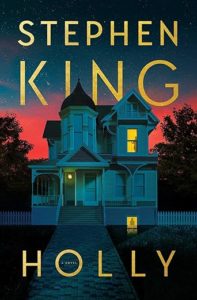 ‘Tis the season, by which I mean autumn and time for the annual (or more) Stephen Kjng book. Like the other books written in which Holly Gibney solves (or helps to solve, the first time out) mysteries, this book is not a mystery for the reader to solve, but rather, to watch the characters solve. Usually, the tension to a mystery novel where you already know whodunnit is in watching your hero (or heroes) work it out. Yes, they’ll solve it, but how? And will it be in time to save… well, no, too late for them, but what about… okay, but surely in time to save, well, whoever you want to see survive after the halfway point of the book.
‘Tis the season, by which I mean autumn and time for the annual (or more) Stephen Kjng book. Like the other books written in which Holly Gibney solves (or helps to solve, the first time out) mysteries, this book is not a mystery for the reader to solve, but rather, to watch the characters solve. Usually, the tension to a mystery novel where you already know whodunnit is in watching your hero (or heroes) work it out. Yes, they’ll solve it, but how? And will it be in time to save… well, no, too late for them, but what about… okay, but surely in time to save, well, whoever you want to see survive after the halfway point of the book.
But this is Stephen King, and he has named the book after its main character. So in this case, the tension is in whether Holly will solve the mystery before the mystery solves her! … Alright, that one got away from me. But seriously, I was nervous on page 1, and I was nervous on page 301[1].
I suppose I’ve said nothing about the plot. The book opens on the very worst night of a Hispanic literature professor’s life, and proceeds forward over the course of several years and several victims of a pair of undetected serial killers, in parallel with Holly’s present-day travails in the age of Covid, until, inevitably, they cross paths via a missing person’s case her detective agency is hired to solve.
Which reminds me of something I’d already suppressed over the last few days since I finished the book, which is… King is maybe too political for my tastes here. And I say this as someone who shares his politics, but, wow, fully justified, pre-established viewpoint character or not, this was the most polemical work of fiction I’ve read this side of Terry Goodkind. I wonder if it will hurt his sales. I also wonder if it will read differently with the passage of time, by which I mean, will it hit the same when people aren’t still being constantly infected by this thing? Maybe it won’t feel quite as cartoonishly diatribical when people aren’t still glaring dismissively at each other in real time.
I feel like I’m complaining here. Ultimately, this did not hurt my enjoyment of the book, it just started out so strongly positioned, in a way I’m not used to thinking about his fiction ever being. And I don’t want to be complaining, particularly when I don’t know how many new King novels I have left to read. Which is I suppose an appropriate mix of maudlin and morbid, for both the subject matter and the season which I so recently ’tissed.
[1] Pagination simulated for effect